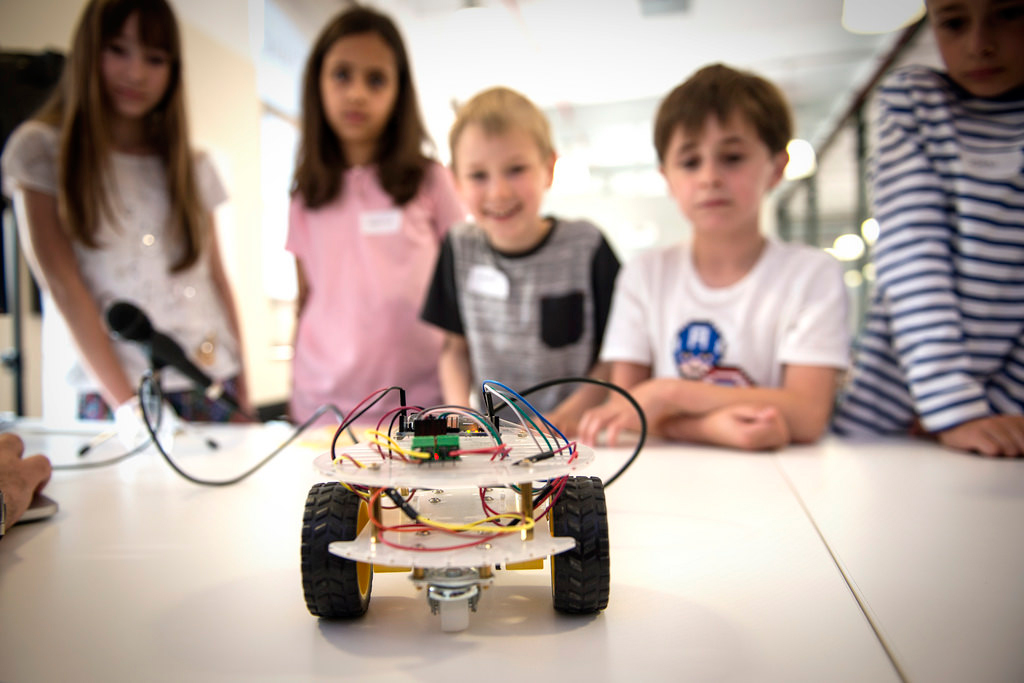The UOC teaches children to program through play
Volunteer computing teachers will give workshops for children in Manresa, Reus, Salt, Terrassa and Tortosa, all on the same day, and later in Lleida and SevilleScratch is a simple, fun programming language that fosters creativity and logical thinking in children and young people

Can children really learn to program their own games, stories and animations in a fun and simple way? This is the premise that led to Scratch, a programming language created by the Massachusetts Institute of Technology (MIT) and aimed at children aged between 8 and 12. To mark Scratch Day, a worldwide initiative to be held on Saturday 11 May, the Universitat Oberta de Catalunya (UOC) is organizing family workshops and activities at the centres in Manresa, Reus, Salt, Terrassa and Tortosa. The University will also be giving workshops at the centres in Lleida and Seville on Saturday 18 May.
Throughout the morning, a team of volunteer computing teachers from the Inventa group at the UOC will be showing children the world of the Scratch programming through games and challenges that the families taking part will have to solve with the help of Scratch Cards. For the experts, this programming language offers a number of benefits for children:
- It develops logical thinking: the child is able to break down a problem into small parts, which makes them follow it sequentially to find the answer.
- It fosters creativity: children and young people have to make up stories and create games.
- It improves understanding: children can see first-hand how the computer carries out their orders.
- It aids systemic thinking: programming allows children to understand how a system works and how the parts relate to each other.
- It improves school performance: children learn programming, mathematical concepts, some words in English, etc.
According to computer engineer Adriana Ornellas, professor at the UOC's Faculty of Psychology and Education Sciences and member of the University's Inventa group, "the intellectual activity associated with programming teaches you to think in an abstract, logical and structured way". She added that "tools like Scratch boost learning through enquiry, through research and through problem-solving".
For his part, Carlos Casado, director of the UOC's University Master's Degree in Multimedia Applications: Smart Content Design and Development, stated that programming helps children "to think and solve problems" because "they work on understanding, they analyse the possible solutions and they split them up into smaller problems to be able to solve them more easily". Also, if children familiarize themselves with programming from a young age, it helps shatter the myth that "technology is for men", Casado concluded.
Families taking part in the UOC workshops will also be able to see some of the applications of Scratch with Arduino and LEGO. They just have to bring along a laptop with a Windows or iOS operating system and register beforehand on the activity website.
Scratch reduces social inequalities
Besides the educational benefits already discussed, Scratch also contributes to narrowing the digital divide and to reducing social, economic and gender inequalities. That is why South America is seeing the creation of actions aimed at the promotion and use of Scratch as a tool that leads to changes in social environments and that is able to impact positively on communities and families in the region. The UOC has mentored a number of the organizations carrying out this project in Latin America, through training teachers, as part of the Scratch Social UOC project.
This year, the Tomás Marsano school in Arequipa, Peru, will be organizing a week of activities with Scratch, bringing together students from their institution and inviting educational organizations from the same city. In Ecuador, Espiral Educativa, together with Medialab CIESPAL, the Central University of Ecuador and the Yavirac Higher Institute of Technology, will be running training and programming activities for children, families and teachers. In Colombia, teachers linked to Computadores para Educar (Computers for Schools) and the country’s Ministry of Education have run an online safety course and are encouraging teachers to prepare activities to mark the worldwide celebration of Scratch Day.
The Scratch Social UOC project offers a training pathway in Scratch and new technologies to professionals and volunteers from educational institutions, associations, social agencies and NGOs that work with children and young people and vulnerable groups. The aim is to help everyone learn programming language and so contribute to narrowing the digital divide, reducing social, economic and gender inequalities and increasing the presence of women in technology. With Scratch, agencies can work on emotional aspects such as children’s motivation and self-esteem, as well as developing cognitive skills such as logic and problem-solving.
The project is just one of the ways the UOC contributes to the United Nations 2030 Agenda and seeks to foster the use of ICT in educational and social communities, especially in those in a situation of risk and vulnerability.
Experts UOC
Press contact
-
Editorial department
